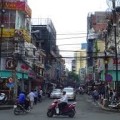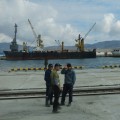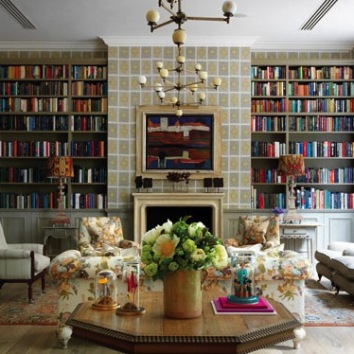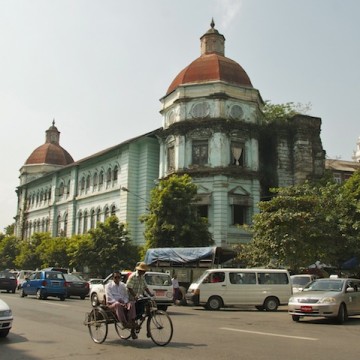
Doing business in Myanmar
— October 1, 2013Change is happening fast in Myanmar. For 50 years the country stagnated under the thumb of the ruling military junta, weighed down by tough economic sanctions, but the window to the world blew open in March 2011 when a new government took office and with it came sweeping reforms.

The last couple of years since the lifting of sanctions have seen a lot of positive changes with international financial institutions and trade groups returning. In July 2012, UK Trade & Investment opened offices in Yangon, the World Bank opened an office in Yangon in August 2012 and the Asian Development Bank now has offices in the city, too. There are also plans in the pipeline to set up Myanmar’s first stock exchange – with the support of the Tokyo Stock Exchange.
Last year Myanmar’s currency was also finally unified and the official rate of six kyats to the US dollar ditched in favour of the real, black market rate of about 800 kyats to the dollar.
Myanmar is a country rich in natural resources – gems, jade, minerals, natural gas and forestry. Some of the world’s big multinational companies have wasted little time staking out a foothold in the new economy. The financial services company Visa began processing retail payments earlier this year, but poor infrastructure is its biggest hurdle. Myanmar’s phone network is basic at best and coverage is limited. Mobile phones are becoming more popular as they become cheaper, but the SIM cards are still among the most expensive in the world. And the internet is still in its infancy with access to less than 1% of the country.
Much has been achieved in a short time and money has flowed into the country, but there are many areas of concern. Myanmar’s physical infrastructure and financial systems are in bad shape after decades of isolation and poverty. Transportation is unreliable, the electricity supply is erratic and international mobile phone use isn’t generally possible. There is also weak enforcement of property rights, an underdeveloped legal framework and corruption. Furthermore, the ongoing ethnic conflicts impact investment decisions.
American Robert Walsh studied Burmese while in the army and went on to work in Myanmar for seven years while in government. When the country began to open up he was flooded with offers to return and accepted a project with a large Korean company to prepare an evolving business climate survey. He is still in Yangon working in business and project management and says although there is a tendency to view Myanmar as a Wild West, the issues are much more complex.
He says electrical power is the biggest barrier for development and although it’s a priority for the government, he expects it will hamper growth for some time yet. And there’s another big headache for businesses that need land in order to operate.
“If you need 10 to 20 acres, getting that land is tough unless you are willing to work through a local partner,” he says.
It’s the potential local partners that are sitting pretty. Many are holding onto a lot of cash as they haven’t been able to send it out of the country – and land, which Walsh says is the same as cash at the moment. They are in a position to be very selective about which foreign project interests them.
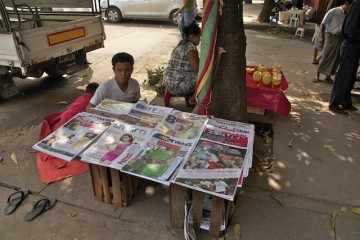 Three special economic zones were set up to attract foreign investment – Dawei (southern Myanmar), Thilawa (outside Yangon) and Kyaukphya (west coast) – but they haven’t taken off and Walsh says that’s a lot to do with ongoing land deals. He sees the country as being in the midst of a land bubble. Aung San Suu Kyi
Three special economic zones were set up to attract foreign investment – Dawei (southern Myanmar), Thilawa (outside Yangon) and Kyaukphya (west coast) – but they haven’t taken off and Walsh says that’s a lot to do with ongoing land deals. He sees the country as being in the midst of a land bubble. Aung San Suu Kyi
“There are industrial parks that came available years ago but no one has taken a shovel to them. A lot of the plots of land have changed hands and are still changing hands. Thilawa is still empty,” he says.
The bulk of foreign investment coming into the country is from companies that want to sell things: “Consumers here are sick to death of anything made in China because Chinese products last about a week. The overwhelming preference is for Korean things, Japanese things; any American products can command a high price.”
In June, Coca-Cola opened its first bottling plant in the country since before World War II. Another American company hoping to get a slice of the action is carmaker Ford, set to open a showroom in Yangon and with plans to expand its presence across the country.
“I’ve seen American companies coming in. They’re just getting their feet wet. Ford has a very long row to hoe, as they say in Arkansas. But they’re bringing in Toyotas and people here are comfortable with them and know how to fix them,” says Walsh.
But recent success stories have been overshadowed in the media by ethnic conflicts and risk seriously damaging the country’s investment environment. Since 2012 hundreds of people have died and many thousands been displaced due to conflicts between Buddhists and Muslims.
The problem is a longstanding one and can be traced back to independence in 1948 when the country was keen to meet the goal of national construction. Since that time the Bamar people, who make up about 60% of Myanmar’s population, have dominated the government’s decisions. The rest of the population, which is divided into five main minority groups, although there are many other smaller ones, has been left out and so the seed of discontent was sewn. What’s more, the areas with the most natural resources – and so most attractive for investment – overlap with the regions where the ethnic minorities live.
Corruption is also an issue. Transparency International, the global coalition against corruption, ranks Myanmar 172 out of 176 countries in its 2012 Corruption Perception Index. The government has put in place measures to increase transparency and reduce corruption, but for years, military leaders and their cronies ran the country and not all are happy with the new way of doing business.
Walsh acknowledges the problem, but says it hasn’t been a significant concern for him: “Corruption exists, but in terms of us as a foreign company coming in, we didn’t see it that much. Any wheels that had to be greased just took a little bit of grease.”
He says the corruption is focused among the Burmese business people: “Currently the biggest black market here is the black market in information. It’s the Burmese trading on insider information – what’s coming up for sale, the likely price,” he says.
Laws and practices governing doing business in Myanmar are undergoing rapid changes. Since autumn 2011 – and the second session of the new government – more than 40 laws have been enacted, including the new foreign investment law that improves some incentives offered to investors but also imposes a number of restrictions.
“There was a lot of back and forth with the new foreign investment law. It’s set now and offers a good balance of protection for both foreign firms and the local market,” says Walsh.
A recent report by the McKinsey Global Institute sees huge potential: “Managed well, Myanmar could conceivably quadruple the size of its economy, from US$45 billion in 2010 to more than US$300 billion in 2030 – creating upward of 10 million non- agricultural jobs in the process.”
The report – “Myanmar’s Moment: Unique Opportunities, Major Challenges” – notes that the country is on track to grow about 4% per year, but that it could move ahead at a whopping 8% a year if it accelerates the rate of annual labour-productivity growth and the only way to do that is to diversify the economy. The current strategy, relying on energy and mining, will not realise that growth.
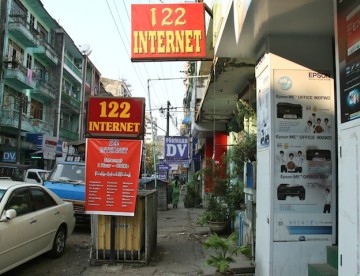 The report points to a number of areas that have been largely overlooked and could help boost economic growth. Chief among them is the potential of technology. Isolated for so many decades, Myanmar’s mobile and internet technology are still in their infancy, but aggressively boosting the telecommunications infrastructure could help fast-track growth.
The report points to a number of areas that have been largely overlooked and could help boost economic growth. Chief among them is the potential of technology. Isolated for so many decades, Myanmar’s mobile and internet technology are still in their infancy, but aggressively boosting the telecommunications infrastructure could help fast-track growth.
It also recommends a shift away from agriculture toward manufacturing and that the country should prepare for an expected movement of the population towards the cities by careful urban planning and a shift to local governance. Better connections with the global economy through trade and investment are also highlighted.
“Trade volumes are not only low but also undiversified and Myanmar could expand its trade opportunities and increase population flows to encourage knowledge transfers, the building of skills and expanded tourism,” the report says.
Myanmar is a country with plenty of risks, but Walsh believes they are manageable: “The major risk is someone getting you to do something where ownership of land is not clean, clear and sweet. And you’ve got to be careful in the regions where the government hasn’t completely cemented the situation with the ethnic groups.”
The days of reckless behaviour in business are long gone and foreign investors need not fear the extreme losses such as those felt by joint venture firms Mandalay Beer and Peregrine Holdings in the 1990s when the military confiscated their profits. Those companies are still fighting for compensation.
BUSINESS TIPS AND ETIQUETTE
Business networking in Myanmar is a very personal thing. The Burmese are polite and hospitable and it’s important to not only respect their culture but to conduct business at their pace.
The key is patience. There may be several seemingly unnecessary meetings before a business deal is closed, but these meetings are valuable, they’re about building up trust. And good connections and solid working relationships can go a long way, particularly in Asia.
“If you want to do business in Myanmar you have to physically be here – you have to be with people, meet with them and listen to them,” says Walsh.
The practice of exchanging business cards is common – it is considered polite to take a moment to read the card and politer still to give and receive cards with both hands.
A respect for elders flows through all aspects of Burmese life and it is polite to stand up when an elder person enters the room. It is not uncommon for small gifts to be given, part of the Burmese hospitality. If a gift is received, it should always be repaid later.
Men dominate the Burmese business world, although that is beginning to change and Aung San Suu Kyi is a great role model for women. While it is common for men to greet each other with a handshake in a business setting, it is less so for women. It is best to err on the side of caution and if the woman doesn’t offer her hand to shake then offer a small bow instead.
The national dress is the longyi, a traditional wrap-around skirt, and it is worn by both men and women. Businessmen wear the longyi to formal meetings with either a collarless shirt or a western-style top and some may wear a suit. Women usually wear it with a blouse.
The often hot and humid conditions can make a standard western suit a poor choice. The best option for westerne.rs is smart trousers and a shirt or polo shirt. Foreigners would be well advised to avoid donning a longyi unless they are experienced as it can take time to master the art of fastening it securely.
BURMA OR MYANMAR?
It’s a politically loaded question – and is a bigger issue outside the country than within.
Burma is a British name, a corruption of “Bamar”, and refers to the majority ethnic community. In 1989, a year after thousands were killed in the suppression of a popular uprising, the ruling military junta officially changed the English name of the country from Burma to Myanmar. The junta claimed it helped separate the country from its colonial past and better represented the country’s ethnic diversity. The English versions of many other place names were also changed, such as Rangoon to Yangon.
Opponents of the junta rejected the new name, arguing that “Myanmar” wasn’t ethnically neutral either as the local term “Myanmah” also refers to the Bamar. As a telling reminder of the country’s long-standing tension with the ethnic minorities, it is worth noting that there is no term in English or Burmese that covers both the bama/myanma and the ethnic minorities.
Today the name Myanmar – as well as Yangon – is widely used within the country, seen by many as easier to pronounce. But acceptance in the English-speaking world has been slow with many, including the BBC and the US and UK governments, still referring to Burma.
When democracy icon Aung San Suu Kyi toured Europe last year she referred to her country as Burma, a sign of the continued disagreements between her and the new government leaders.
[PDF url=https://www.hongkongkate.com/wp-content/uploads/2014/07/Acumen6_2013-FOR-KATE-WHITEHEAD.pdf]

